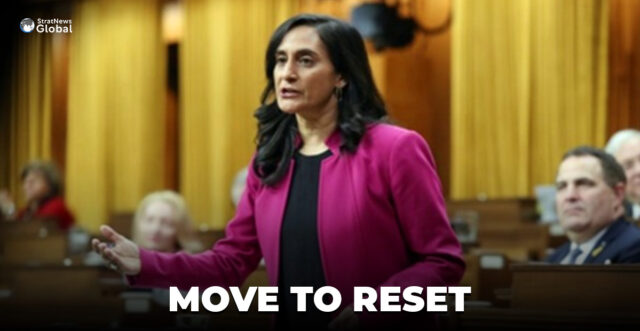Canadian Foreign Minister Anita Anand is expected to visit India on October 13–14, in what will be the first ministerial-level engagement between the two countries since relations plunged in 2023.
She will hold talks in New Delhi with External Affairs Minister S. Jaishankar as both governments attempt to reset ties after a prolonged diplomatic standoff.
The visit comes against the backdrop of efforts to restore normalcy, including the reappointment of high commissioners and the easing of restrictions on diplomatic staff. The two sides also resumed security-level talks last month when their national security advisors met in New Delhi. Anand’s trip is aimed at carrying that momentum forward.
Counter-terrorism and security cooperation are expected to feature prominently in the discussions, particularly collaboration on intelligence sharing and tackling transnational organized crime. Both governments have signalled the need to cooperate on law enforcement despite the strains of the past two years.
The most difficult issue remains the fallout from the Nijjar and Pannun cases. Hardeep Singh Nijjar, a Sikh separatist leader, was killed in British Columbia in June 2023. In September that year, then–Prime Minister Justin Trudeau accused Indian agents of involvement, prompting India to expel Canadian diplomats. Relations dropped to historic lows.
The situation shifted in April 2025, when Mark Carney became Canada’s prime minister and indicated a softer approach toward India. By August, both countries had appointed new high commissioners, and quiet talks resumed.
The U.S. and Canadian investigations into assassination plots linked to Sikh separatist leaders continue to weigh heavily on ties. A 61-page U.S. court filing in September alleged links between Nijjar’s killing and a failed attempt to assassinate Gurpatwant Singh Pannun.
The documents cite communications involving former Indian intelligence officer Vikas Yadav and alleged middleman Nikhil Gupta. India has denied the allegations, with the Ministry of External Affairs declining to comment on the proceedings and accusing critics of drawing premature conclusions.
The situation is further complicated by the Lawrence Bishnoi Gang, which the Canadian government recently designated a terrorist entity. The group, with an international network, has been linked to Nijjar’s killing and has claimed responsibility for fresh shootings in Canada.
Diplomatic observers say Anand’s visit is significant because it shows a willingness on both sides to engage despite unresolved disputes. For Canada, it represents an opportunity to stabilize ties with a key Indo-Pacific partner while pursuing sensitive legal cases. For India, it will be a measure of Ottawa’s seriousness in preventing separatist politics from dictating the bilateral agenda.
While few expect major breakthroughs, the fact that such high-level talks are taking place is seen as an indication that both countries are prepared to move forward cautiously. Anand’s meetings in New Delhi are expected to set the tone for future dialogue and may help lay the groundwork for a more pragmatic relationship.





